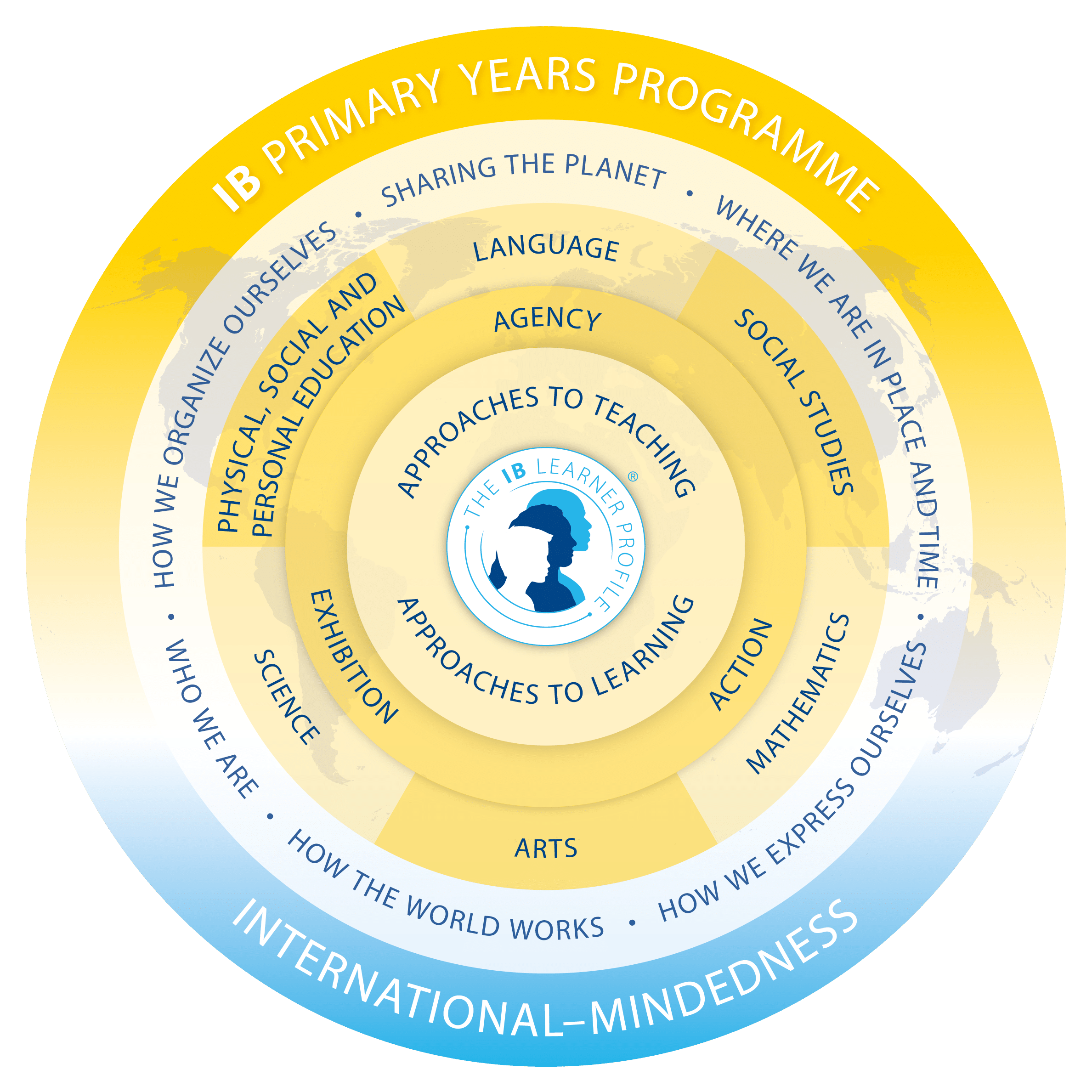The Primary Years Programme (PYP), designed for children aged 3 to 12, is an internationally recognized curriculum framework that focuses on the holistic development of students. Rooted in inquiry-based learning, it fosters critical thinking, collaboration, and intercultural understanding, preparing students to become global citizens and lifelong learners.

What is the Primary Years Programme?
The PYP is part of the International Baccalaureate (IB) continuum of education, designed to nurture and develop young learners into caring, active participants in a lifelong journey of learning. It emphasizes inquiry, encouraging students to engage in their own learning by exploring real-world issues. This inquiry-based approach supports the development of critical thinking skills, problem-solving abilities, and creativity, making it a highly respected choice for schools worldwide.
The PYP Curriculum Framework
The PYP curriculum is built around six transdisciplinary themes, which guide the learning process:
Who We Are
Exploring identity, beliefs, values, and what it means to be human.Where We Are in Place and Time
Delving into orientation in place and time, focusing on history, geography, and the development of civilizations.How We Express Ourselves
Understanding the ways in which people discover and express ideas, feelings, culture, beliefs, and values.How the World Works
Examining the natural world, scientific principles, and human interaction with the environment.How We Organize Ourselves
Exploring human-made systems, decision-making processes, and organizational structures.Sharing the Planet
Investigating the interdependence of people, communities, and ecosystems.
These themes are not confined to a single subject area; they encourage students to see connections across various disciplines, promoting a comprehensive understanding of the world.
Inquiry-Based Learning in the PYP
At the heart of the PYP is inquiry-based learning, where students are encouraged to ask questions, investigate, and develop a deeper understanding of the world around them. Teachers act as facilitators, guiding the learning process while allowing students to take ownership of their learning. This approach helps students to:
- Develop critical thinking and problem-solving skills.
- Foster curiosity and a love of learning.
- Enhance collaboration and communication with peers.
- Build self-confidence and independence in learning.
The Role of Assessment in the PYP
Assessment in the PYP is ongoing and varied. Rather than relying solely on traditional exams, the PYP uses formative assessments (continuous feedback) and summative assessments (final demonstrations of learning). These assessments help to monitor student progress and provide opportunities for reflection, enabling both students and teachers to understand learning outcomes and areas for growth.
Key forms of assessment include:
- Formative Assessments: Daily checks for understanding, classroom activities, and peer evaluations.
- Summative Assessments: Larger projects or performances that allow students to demonstrate their knowledge and skills at the end of a unit.
- Portfolios: A collection of student work that showcases growth and learning over time.
- The PYP Exhibition: In the final year, students participate in the PYP Exhibition, a culminating project that showcases their ability to conduct independent inquiry and reflect on their learning journey.
PYP and Global Citizenship
A significant emphasis in the PYP is on developing global citizenship. Students are encouraged to view the world from multiple perspectives, understanding that their actions can impact others locally and globally. This focus on international-mindedness helps students develop empathy, respect for cultural diversity, and a sense of responsibility to make the world a better place.
Learner Profile Attributes
The PYP aims to develop students who exhibit the attributes of the IB Learner Profile. These attributes are at the core of the PYP’s educational philosophy and serve as the foundation for student development:
- Inquirers: Curious, independent learners.
- Knowledgeable: Well-informed and insightful.
- Thinkers: Critical and creative problem-solvers.
- Communicators: Able to express ideas confidently and creatively.
- Principled: Honest and responsible.
- Open-minded: Respectful of other perspectives and cultures.
- Caring: Compassionate and empathetic.
- Risk-takers: Courageous in trying new things.
- Balanced: Well-rounded in personal well-being.
- Reflective: Thoughtful about learning and experiences.
The Impact of the PYP on Academic and Personal Growth
Research shows that students who participate in the PYP are better equipped to meet the challenges of secondary education and beyond. The PYP fosters a love of learning, critical thinking, and adaptability—skills essential for success in an ever-changing global landscape. Furthermore, the focus on intercultural understanding helps students navigate diverse environments with confidence and empathy.
Benefits for Teachers and Schools
The PYP also benefits teachers by offering professional development opportunities that promote reflective teaching practices. Teachers in PYP schools collaborate regularly, sharing ideas and strategies that enhance the educational experience for students. Schools that implement the PYP often see an increase in student engagement, parent involvement, and academic performance, making it a valuable addition to any institution.
Why Choose the PYP?
The PYP stands out as a leading educational framework due to its holistic approach to learning. It goes beyond the acquisition of knowledge to focus on the overall development of the student. Schools implementing the PYP provide a dynamic learning environment that adapts to the needs of individual students, helping them thrive both academically and personally.
The Primary Years Programme (PYP) offers an enriching and comprehensive learning experience that prepares students for success in a globalized world. Its inquiry-based approach, focus on the whole child, and commitment to developing international-mindedness make it a top choice for forward-thinking schools and families. Through the PYP, students become independent learners, critical thinkers, and compassionate global citizens—equipped with the skills and values necessary for a fulfilling future.
The Kintess School is a Candidate School* for the Primary Years Programme (PYP). This school is pursuing authorization as an IB World School. These are schools that share a common philosophy—a commitment to high quality, challenging, international education that the Kintess School believes is important for our students.
*Only schools authorized by the IB Organization can offer any of its four academic programmes: the Primary Years Programme (PYP), the Middle Years Programme (MYP), the Diploma Programme, or the Career-related Programme (CP). Candidate status gives no guarantee that authorization will be granted. For further information about the IB and its programmes, visit www.ibo.org.